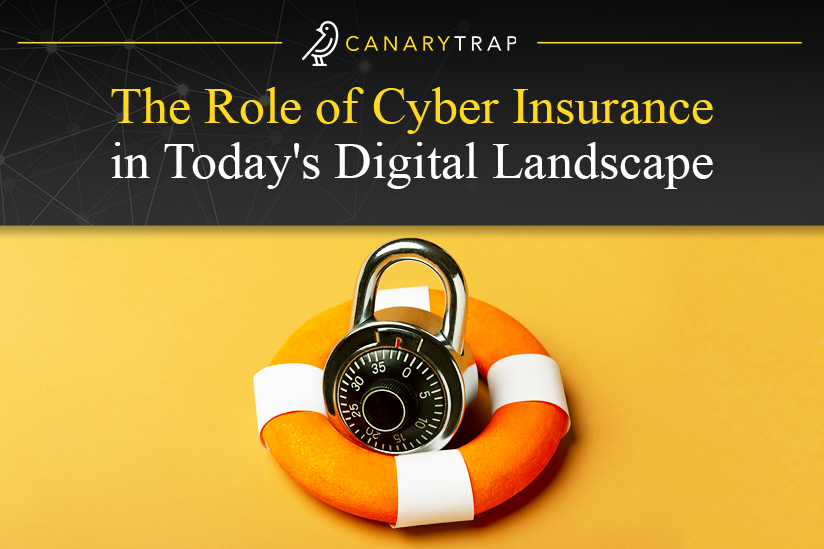The Role of Cyber Insurance in Today’s Digital Landscape
- October 6, 2023
- Canary Trap
In an era where cyber attacks are on the rise, businesses of all shapes, sizes and industry types are increasingly recognizing the importance of safeguarding their digital assets. With the proliferation of sophisticated cyber criminals and constantly evolving attack vectors, it’s no longer a question of “if” but “when” your organization will face a cyber incident.
Cyber security measures are essential, but are they sufficient? The relentless nature of cyber threats requires a multi-layered defense strategy, and cyber insurance is a crucial layer that should not be overlooked. It offers financial protection, expert guidance, legal compliance, and reputation management.
But with that in mind, yet another question arises: is cyber insurance worth the price of admission? In this blog post, we’ll delve deep into the world of cyber insurance to help you understand its value and relevance to your cyber security and risk management strategy.
What Is Cyber Insurance?
Cyber insurance is a specialized type of insurance coverage designed to mitigate the financial losses and liabilities associated with cyber incidents and data breaches. It provides financial protection by helping cover the costs incurred in the aftermath of a cyberattack. The policies usually cover costs such as:
- Incident Response Expenses. This includes costs related to investigating the breach, notifying affected parties, and implementing immediate measures to contain the incident.
- Data Recovery and System Restoration. The costs of restoring systems, data, and networks to their pre-incident state can be substantial. Cyber insurance can cover these expenses.
- Legal and Regulatory Costs. Cyberattacks can lead to legal actions, regulatory fines, and compliance requirements. Cyber insurance can assist in covering legal fees and fines incurred due to non-compliance.
- Reputation Management. A cyber incident can tarnish your organization’s reputation. Cyber insurance may cover the costs of public relations efforts to rebuild trust and mitigate reputational damage.
- Business Interruption Losses. When a cyber incident disrupts your operations, resulting in revenue loss, cyber insurance can compensate for these financial losses.
- Ransom Payments. In cases of ransomware attacks, where cybercriminals demand payment to release encrypted data, cyber insurance can cover the ransom costs.
In a study presented at the California State University, it is mentioned that “cyber insurance plans began to include coverage to damages caused by employees (intentional or accidental), fines and penalties faced in court, and damages related to malware. Thankfully, it continued to grow, and presently policies cover an enormous number of situations ranging from cyber extortion to potential funds lost during a business interruption.”
“This is important because unfortunately, malicious attacks are something that all companies must deal with. There is no reasonable way to avoid all risks of using technology. Even companies that implement strong cybersecurity programs can be impacted by new vulnerabilities that are exposed almost every day”, commented author John Romanski.
How Does Cyber Insurance Work?
Even though cyber insurance can help countless organizations, it cannot be considered as the only solution to cyber attacks. Understanding how cyber insurance works is therefore essential for making informed decisions about coverage. Let’s break down the process step by step:
- Policy Selection. Begin by selecting an appropriate cyber insurance policy tailored to your organization’s needs. Policies can vary significantly, so it’s essential to work closely with an insurance provider to determine the right coverage for your specific risks.
- Risk Assessment. Your insurer will assess your organization’s cybersecurity posture and potential vulnerabilities. This assessment helps determine the level of risk and the corresponding premium.
- Policy Purchase. After evaluating your risk profile, you purchase a cyber insurance policy. Premiums typically depend on factors like your industry, the size of your organization, and the extent of coverage.
- Incident Occurrence. In the event of a cyber incident, such as a data breach or malware attack, you promptly report the incident to your insurer. The notification process often has specific requirements and timeframes outlined in your policy.
- Incident Response. Upon receiving your report, your insurer mobilizes an incident response team of experts that help you contain the breach, assess the damage, and develop a plan for recovery.
- Coverage Activation. Depending on the policy terms, your insurer covers the costs associated with the incident. This may include legal fees, forensic investigations, public relations efforts, and financial losses.
- Coordinated Recovery. With your insurer’s support, you work to recover from the incident. This includes restoring systems, notifying affected parties, and addressing any legal or regulatory obligations.
- Claim Settlement. Once the incident response and recovery processes are complete, your insurer settles the claim based on the coverage outlined in your policy.
- Ongoing Risk Mitigation. To maintain coverage and reduce future risks, your organization should continually improve its cybersecurity measures. Some insurers may even offer risk management services to help enhance your security posture.
- Renewal and Adjustments. Cyber insurance policies are typically renewed annually. As your organization evolves and your risk profile changes, you can adjust your coverage to align with your current needs.
Forbes Advisor’s Jason Metz explains it in a way that is easy to understand: “If you are the victim of a cyberattack, you can file a claim to help pay for expenses and direct financial losses covered by your policy. The policy will have a coverage limit and a deductible.
For example, if you have a cyber insurance policy that has online fraud coverage with a $15,000 policy limit and a $500 deductible, and you were the victim of an online scam and donated $2,000 to a fake charity, you would get an insurance check for $1,500 ($2,000 minus $500 deductible).”
Benefits of Cyber Insurance
The primary benefit of cyber insurance is coverage in case of emergency. Knowing this safety net exists can bring peace of mind to your stakeholders and board members. Future clients may also feel reassured that if a cyber incident happens, a mechanism is in place for compensation for stolen customer information.
Daniel Klein, chief business officer for Cynet, says it’s hard to make an argument against cyber insurance, considering the average cost of a breach for organizations.
“An immediate knock-on benefit of getting a cyber insurance policy is that the organization’s security posture will be improved to meet the insurer’s requirements,” he says. “Yes, this may mean investing in additional security personnel and better tools, but overall risk will be reduced as a result.”
Cybersecurity insurance firms typically provide resources and additional assistance when breaches occur. This legal guidance and referrals to specialists can be invaluable for companies that are otherwise unprepared for the severity of a breach.
Additionally, cyber insurance policies can help create awareness for cybersecurity compliance needs at your organization and strengthen your overall security measures and program. That said, it’s still crucial that you not become complacent about security risks. Remember that insurance is only one part of a robust unified risk management system – not a replacement for it.
Choosing the Right Cyber Insurance
Not all cyber insurance policies are created equal. Let’s analyze how to ensure you get the most value for your investment.
- Assessing Your Needs. Evaluate your business’s unique cybersecurity risks and needs before selecting a policy. Consider your industry, the type of data you handle, and your existing security measures.
- Policy Coverage. Carefully review the coverage offered by different policies. Ensure it aligns with your potential risks and includes key aspects like first-party and third-party coverage.
- Policy Limits. Pay attention to policy limits and sub-limits. Make sure they adequately cover the potential costs you might face in the event of an incident.
Weighing the Costs
Now, let’s address the fundamental question we had on our minds since the beginning. Is the cost of cyber insurance justified?
- Cost vs. Risk. Consider the potential financial impact of a cyber incident compared to the cost of insurance premiums. In most cases, the cost of insurance is significantly lower than the potential losses. As it was explained in an article by the New Straits Times, “The growing realization of the extensive cost outlay of a cyber event is now sitting uncomfortably for boards, risk managers and finance departments. Costs scale quickly and multifacetedly, […] including digital forensics, public relations, legal, and business interruption. The response costs alone can accumulate to several million dollars for a single event.”
- Peace of Mind. Beyond the financial aspect, cyber insurance provides peace of mind. Knowing you have a safety net can reduce stress and allow you to focus on your core business activities.
In Conclusion
Cyber insurance has become a vital tool in modern risk management, and as such, it should not be considered just an added expense, but rather a strategic investment in your business’ resilience. It provides financial protection and support in the event of a cyber incident, helping your organization navigate the complex aftermath of a cyberattack while mitigating the associated financial risks.
The evolving threat landscape makes it imperative to have a comprehensive cybersecurity strategy, and cyber insurance plays a vital role in that strategy. The real question is not whether you can afford cyber insurance but whether you can afford not to have it. By considering cyber insurance as a critical component of your cybersecurity arsenal, you can protect your business, safeguard your customers, and secure your future.
SOURCES:
- https://scholarworks.calstate.edu/downloads/qr46r544c
- https://www.forbes.com/advisor/homeowners-insurance/personal-cyber-insurance/
- https://healthtechmagazine.net/article/2023/02/cyber-insurance-for-healthcare-perfcon
- https://www.nst.com.my/opinion/columnists/2022/04/785994/cyber-risk-insurance-important-current-era

